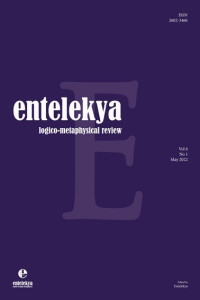Abstract
References
- Açıköz, Hacı Mustafa. Sağduyu Eylem Felsefesi. Ankara; Elis Yayınları, 2017.
- Cuneo, Terence. “Thomas Reid.” Stanford Encyclopedia of Philosophy. https://plato.stanford.edu/entries/reid-ethics. Accessed: 21 July 2021.
- Locke, John. An Essay Concerning Human Understanding. Ed. Jonathan Bennett. Oxford: Oxford University Press, 1998. https://www.earlymoderntexts.com. Accessed: 25 June 2021.
- Reid, Thomas. Essays on the Active Powers of Man. Ed. Jonathan Bennett. Cambridge; Cambridge University Press, 1788. https://www.earlymoderntexts.com/authors/reid. Accessed: 25 June 2021.
- Reid, Thomas. Essays on the Intellectual Powers of Man. Ed. Jonathan Bennett. Cambridge; Cambridge University Press, 1785. https://www.earlymoderntexts.com/authors/reid. Accessed: 20 June 2021.
- Tunç, Aynur İlhan. Moral Understanding of Thomas Reid. PhD Dissertation. Ankara: Ankara University, 2003.
Abstract
The article focuses on the concept of active power as an ability that activates the agent, who is the implementer of common sense principles in Thomas Reid's philosophy. Reid argues that the use of active power in the process of realizing the principles of common sense in action is very important for the morality of the agent. While the correct use of active power ensures the emergence of honorable and moral actions, the wrong use of this power causes the emergence of evil and immorality. For this reason, Reid defines the concept of active power as a distinctive feature of humans, such as the ability to think. In addition, Reid argues that people are conscious of the existence of their active power. Thus, people are also aware of their own limits. By being aware of other people's active powers, they can regulate their moral relationships. After briefly summarizing Reid's philosophical method in the article, the relationship between common sense principles and active power, which are presented as two important components of action, is discussed.
Keywords
References
- Açıköz, Hacı Mustafa. Sağduyu Eylem Felsefesi. Ankara; Elis Yayınları, 2017.
- Cuneo, Terence. “Thomas Reid.” Stanford Encyclopedia of Philosophy. https://plato.stanford.edu/entries/reid-ethics. Accessed: 21 July 2021.
- Locke, John. An Essay Concerning Human Understanding. Ed. Jonathan Bennett. Oxford: Oxford University Press, 1998. https://www.earlymoderntexts.com. Accessed: 25 June 2021.
- Reid, Thomas. Essays on the Active Powers of Man. Ed. Jonathan Bennett. Cambridge; Cambridge University Press, 1788. https://www.earlymoderntexts.com/authors/reid. Accessed: 25 June 2021.
- Reid, Thomas. Essays on the Intellectual Powers of Man. Ed. Jonathan Bennett. Cambridge; Cambridge University Press, 1785. https://www.earlymoderntexts.com/authors/reid. Accessed: 20 June 2021.
- Tunç, Aynur İlhan. Moral Understanding of Thomas Reid. PhD Dissertation. Ankara: Ankara University, 2003.
Details
| Primary Language | English |
|---|---|
| Subjects | Philosophy |
| Journal Section | Article |
| Authors | |
| Publication Date | May 30, 2022 |
| Published in Issue | Year 2022 Volume: 6 Issue: 1 |

